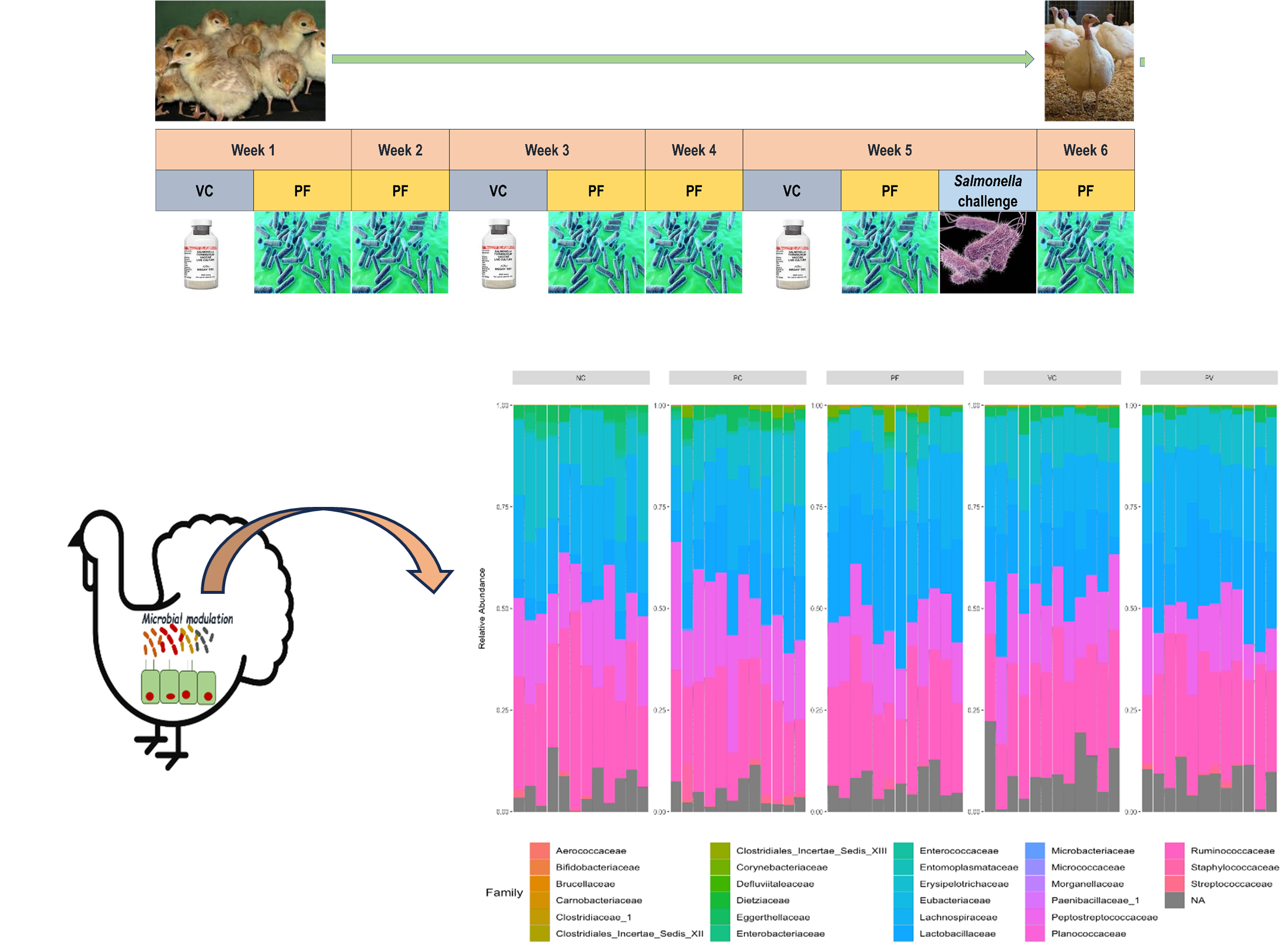Salmonellosis is a major foodborne illness transmitted through contaminated poultry meat and meat products. It causes substantial economic loss to the poultry industry and results in severe public health concerns. Adopting a suitable preharvest intervention can help to reduce Salmonella in turkeys and thereby contamination of meat. There have been several preharvest interventions explored over the past few years, but the efficacy varies with different serotypes of Salmonella. A clear picture of the mode of action of these interventions against Salmonella in the turkey gut could better identify a promising and effective method, which can work against multiple serotypes of Salmonella.
As a PhD candidate, Shijina Raj Manjankattil Rajan (Animal Science), who was awarded her PhD in 2023, worked on a project called Determining the Effect of a Novel Probiotic, Propionibacterium freudenreichii, Alone or Combination With Salmonella Vaccine on Salmonella Colonization and Cecal Microbiome in Turkeys as a UMII MnDRIVE PhD Graduate Assistant. This project aimed to determine how a novel probiotic alone and in combination with a vaccine alters the gut microbiome of 6-week-old turkeys after the Salmonella challenge.
Propionibacterium freudenreichii (PF) is a dairy-origin, FDA-approved safe status probiotic which has proven antibacterial effect against Salmonella Heidelberg in turkeys. However, no studies have been reported on the efficacy of PF alone or in combination with a commercially available Salmonella vaccine when targeting multiple emerging and drug-resistant serotypes of Salmonella colonized in the cecum of turkeys. In the first segment of this research, Dr. Manjankattil Rajan determined the effect of supplementation of PF through drinking water with or without a combination of a Salmonella vaccine against multiple Salmonella serotypes in turkeys. The research showed that these treatments can cause a significant reduction of Salmonella colonization in the cecum and reduce invasion to the liver and spleen of turkeys. The promising results of this study demand more research on changes associated with host-pathogen and vaccine strain interaction in the cecum of turkeys.
Later work determined the effect of probiotic supplementation on the cecal microbiome of turkeys using a standardized protocol. Briefly, cecal samples were collected seven days after Salmonella inoculation, and DNA was extracted. Sequencing was done using the Illumina MiSeq 2x300bp dual indexing method. The amplification of the V4-V6 region of 16S rRNA was done. The data underwent primer removal, filtering, merging, and curation before using the DADA2 pipeline in R for microbial analysis. The effect of interventions on the cecal microflora was determined by measuring relative abundance and alpha and beta diversity. The Firmicutes phyla were the predominant and evenly distributed phyla among all groups. The abundant families across treatment groups include Peptostreptococcaceae, Ruminococcaceae, Lactobacillaceae, and Lachnospiraceae. All treatments significantly improved the species richness and diversity of cecal microflora. Results indicate that PF resulted in non-overlapped clustering of samples from controls on PCoA. On differential abundance analysis, Enterocloster was the least abundant in the negative control group compared to other groups. Streptococcus was higher in negative control, positive control, and vaccine groups than in PF-supplemented groups. Beneficial groups of bacteria, including Faecalicoccus and Neglecta were abundant in PF-supplemented groups. A microbial shift towards beneficial flora was evident in the PF-supplemented groups.
The findings from this study indicate the potential of using PF in preharvest turkey production to improve the gut microflora of turkeys and thereby food safety of turkey products. Poultry meat is an integral part and a rich source of protein in the human diet. Wholesome and microbiologically safe turkey production can be achieved by choosing the right interventions at the farm level. This demands more research on the mechanistic side of the Salmonella control approaches by using -omics and informatics tools. This study can also set down an integral basis for the effective use of informatics platforms in solving problems in the food animal sector, especially in turkeys, where limited studies exist in the area.
Dr. Manjankattil Rajan did this research under the supervision of Associate Professor Anup Kollanoor Johny (Animal Science; MSI PI). Staff from MSI’s Bioinformatics group assisted with the work.
The UMII MnDRIVE Graduate Assistantship program supported U of M PhD candidates pursuing research at the intersection of informatics and any of the five MnDRIVE areas:
- Robotics
- Global Food
- Environment
- Brain Conditions
- Cancer Clinical Trials
This project was part of the Global Food MnDRIVE area.
The UMII program was converted to the Data Science Initiative-MnDRIVE Graduate Assistantship program in the fall of 2023. Research supported by the program is at the intersection of data science and the five MnDRIVE areas. The most recent Assistantships were announced in January 2024. The application period for the next awards will be announced in Fall 2024.
